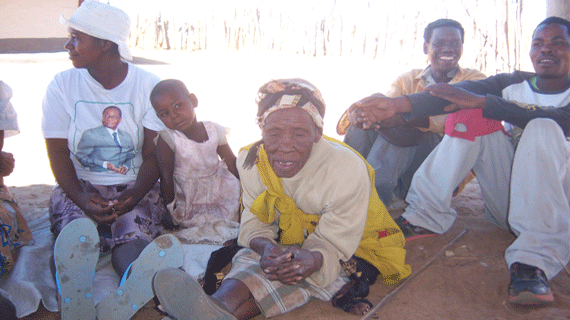
WHEN a people lose their history, tradition, culture and mostly their language, they are bound to lose direction and confidence in themselves.
SILAS NKALA STAFF REPORTER
This is the current scenario prevailing in Tsholotsho and Plumtree where the San, also known as the Khoisan or Amasili, are found. In Mazibulala and Dlamini villages in Tsholotsho there are many elderly San people from whom one expects to research the history, culture and language of these unique people, but sadly none of them can help in this regard.
Even the elderly Gogo Kudukwa Mvundla, who said she was born during the “Sindibhuzwa” or “Mgarapasi” years and Gogo Babili Mpofu who are believed to have experienced the Khoisans’ early stay in Zimbabwe no longer know their language.
The Creative Arts and Education Development Association (Caeda) director Davy Ndlovu, who researches on the ethnic group and knows the San language called Tshwao in Zimbabwe, tried to converse with the two elderly women and discovered that they could not speak their own language with clicks, but only pick some meanings in some words when he speaks and responds in Ndebele or Kalanga.
Caeda is an organisation which lobbies for the interests of the marginalised San group and is registered with the National Arts Council of Zimbabwe.
The Southern Eye observed that other elderly San individuals such as Kuhle Leonard Ncube (71), Nduna Tshuma (72), Mahwitha Ncube (54) and Elizabeth Ncube have totally lost the language and this means a loss of their origin and identity. Southern Eye also observed that almost all San people in Tsholotsho are not named in their Tshwao language surnames and have adopted Ndebele and Kalanga names and surnames.
The most dominant surname among the San community in Tsholotsho is Tshuma. Gogo Mvundla said she knows the Tshwao click though she failed to respond when Ndlovu spoke to her.
- Chamisa under fire over US$120K donation
- Mavhunga puts DeMbare into Chibuku quarterfinals
- Pension funds bet on Cabora Bassa oilfields
- Councils defy govt fire tender directive
Keep Reading
“I know our language and I even speak Kalanga,” Gogo Mvundla who mostly preferred Ndebele when speaking, said.
Gogo Mpofu never said a word in Kalanga or Tshwao, but spoke in Ndebele even though Ndlovu tried to make her speak Tshwao.
This indicates that the San in Zimbabwe have lost their origins just as stated in Ngugi waThiongo’s 1981 novel Decolonising the Mind which posits “language has a dual character that of communication and also acts as a carrier of one’s culture”.
Ndlovu expressed concern that if people as old as Gogo Mvundla and Gogo Mpofu could not pass on their culture, history and language, it means the San culture is doomed and will soon be extinct once these elderly people die.
“When the elderly people like these women could not speak their own language at this age, what does that mean to the younger generation?” Ndlovu asked.
“If their grandchildren cannot learn the language from them, it will simply die with these elderly people.”
In its efforts to revive the Tshwao language, Caeda is organising a 114km charity walk from Bulawayo to Tsholotsho to raise $5 000 for the construction of a Tshwao Learning Centre at Sanqinyana village, to purchase equipment, stationary, food and pay for the running cost of the institution.
The charity walk which had initially been scheduled for October 7 flopped after Caeda failed to get sponsors. Ndlovu said the San languages are increasingly becoming rare and endangered.
“Some of them have less than 100 speakers. The number is fast diminishing and several are known to have become extinct. One of the main reasons is that bilingual Khoisan speakers shift to the dominant language of the area and stop teaching the mother tongue to their children,” he said.
Ndovu said the San have no written records, so the loss of the language could be permanent if nothing is done soon.
This is unlike the San people found in Botswana and Namibia who still speak their languages. Statistics show that there are 2 000 San people in Zimbabwe with 457 found in Plumtree, eight in Matobo and 1 165 in Tsholotsho.
Twitter feedback @silasnkala.










